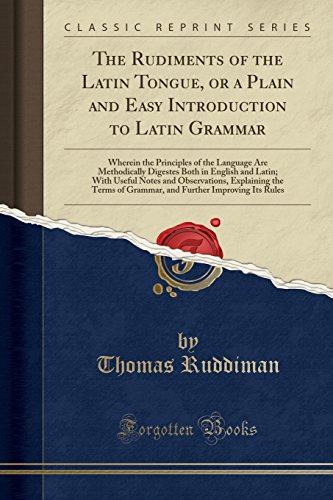Background
Thomas Ruddiman was born in October 1674 in Raggal, Banffshire, Scotland, where his father was a farmer.



(Excerpt from The Rudiments of the Latin Tongue, or a Plai...)
Excerpt from The Rudiments of the Latin Tongue, or a Plain and Easy Introduction to Latin Grammar: Wherein the Principles of the Language Are Methodically Digestes Both in English and Latin; With Useful Notes and Observations, Explaining the Terms of Grammar, and Further Improving Its Rules Scholar. Five and twenty; a? B) C) d) e, ft 8; h) l, is k) l; m, n, 0a P; q r, 3; t: a V) x} y, Z. About the Publisher Forgotten Books publishes hundreds of thousands of rare and classic books. Find more at www.forgottenbooks.com This book is a reproduction of an important historical work. Forgotten Books uses state-of-the-art technology to digitally reconstruct the work, preserving the original format whilst repairing imperfections present in the aged copy. In rare cases, an imperfection in the original, such as a blemish or missing page, may be replicated in our edition. We do, however, repair the vast majority of imperfections successfully; any imperfections that remain are intentionally left to preserve the state of such historical works.
http://www.amazon.com/gp/product/0282752250/?tag=2022091-20
Thomas Ruddiman was born in October 1674 in Raggal, Banffshire, Scotland, where his father was a farmer.
He was educated at the University of Aberdeen.
Through the influence of Dr Archibald Pitcairne he was made assistant in the Advocates' Library, Edinburgh. His chief writings at this period were editions of Florence Wilson's De Animi Tranquillitate Dialogue (1707), and the Cantici Solomonis Paraphrasis Poetica (1709) of Arthur Johnston (1587 - 1641), editor of the Deliciae Poetarum Scotorum. On the death of Dr Pitcairne he edited his friend's Latin verses, and arranged for the sale of his valuable library to Peter the Great of Russia. In 1714 he published Rudiments of the Latin Tongue, which was long used in Scottish schools. In 1715 he edited, with notes and annotations, the works of George Buchanan in two volumes folio. As Ruddiman was a Jacobite, the liberal views of Buchanan seemed to him to call for frequent censure. A society of scholars was formed in Edinburgh to "vindicate that incomparably learned and pious author from the calumnies of Mr Thomas Ruddiman"; but Ruddiman's remains the standard edition, though George Logan, John Love, John Man and others attacked him with great vehemence. He founded (1715) a successful printing business, and in 1728 was appointed printer to the university. He acquired the Caledonian Mercury in 1729, and in 1730 was appointed keeper of the Advocates' Library, resigning in 1752. Besides the works mentioned, the following writings of Ruddiman deserve notice: An edition of Gavin Douglas's Aeneid of Virgil (1710); the editing and completion of Anderson's Seleclus Diplo- matum et Numismatum Scotiae Thesaurus (1739); Catalogue of the Advocates' Library (1733 - 42); and a famous edition of Livy (1751). He also helped Joseph Ames with the Typographical Antiquities. Writing in 1766, Dr Johnson, after reproving Boswell for some bad Latin, significantly adds-" Ruddiman is dead. "
Ruddiman was for many years the representative scholar of Scotland.
(Excerpt from The Rudiments of the Latin Tongue, or a Plai...)
Quotes from others about the person
When Boswell proposed to write Ruddiman's life, "I should take pleasure in helping you to do honour to him, " said Johnson.
He was married to Anna Smith (1694-1769).
